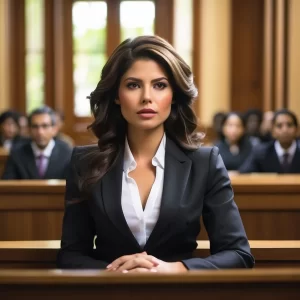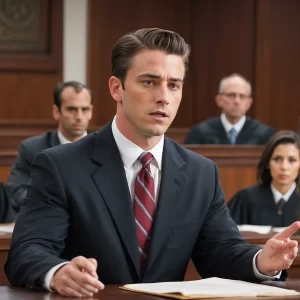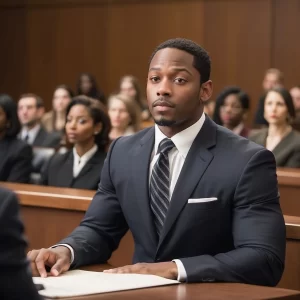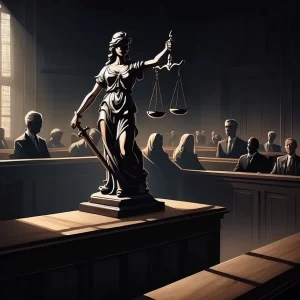Hundreds of Closing Statement Examples
Closing Statement Examples from Famous Trial and Legendary Lawyers
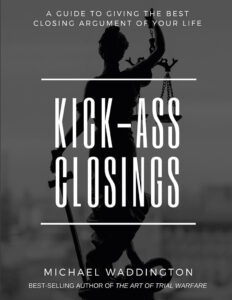 Criminal defense lawyers Timothy Bilecki and Michael Waddington discuss Waddington’s new book, Kick-Ass Closings: A Guide to Giving the Best Closing Argument of Your Life. The book is packed with sample closing arguments from criminal trials.
Criminal defense lawyers Timothy Bilecki and Michael Waddington discuss Waddington’s new book, Kick-Ass Closings: A Guide to Giving the Best Closing Argument of Your Life. The book is packed with sample closing arguments from criminal trials.
Kick-Ass Closings is a powerful resource for new and experienced criminal defense lawyers to deliver devastating closing arguments with minimal prep time. This book provides a simple template that can be used in any criminal trial and hundreds of closing statement examples that can be crafted to fit the facts of your case.
If used properly, this book can save you time and increase the power and effectiveness of your closing arguments. More importantly, it will help save lives and protect the freedom of those we defend.
Contains Hundreds of Closing Statement Examples:
• 310 closing statement examples from dozens of jury trials.
• Closing statement examples made by legendary lawyers such as Johnnie Cochran, Thomas Mesereau, Mark Geragos, Mark O’Mara, Jose Baez, Barry Scheck, Clarence Darrow, Michael Waddington, Timothy Bilecki, James A.H. Bell, Brian Bieber, Cheney Mason, Jerome Buting, Eric Romano, Ian Friedman, Dean Strang, Robert Casale, Gerry Spence, and Paul Bergrin.
• Closing stat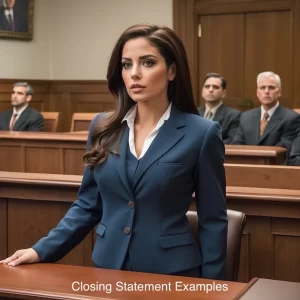 ement examples from the high-profile trials of O.J. Simpson, Casey Anthony, Michael Jackson, Scott Peterson, George Zimmerman, Steven Avery, and the Iron Triangle Murders.
ement examples from the high-profile trials of O.J. Simpson, Casey Anthony, Michael Jackson, Scott Peterson, George Zimmerman, Steven Avery, and the Iron Triangle Murders.
• Dozens of Quotes & Parables that can help drive the point home.
• Charts and diagrams visually demonstrate concepts such as Proof Beyond a Reasonable Doubt, Mistake of Fact, Self-defense, and others.
• A handy table of contents to help you quickly find a winning closing statement and search for closing statement examples.
Closing Statement Examples – What Matters is the Defendant’s Perspective (Self-defense case)
-Michael Waddington, US v. Driver
The prosecutors are implying that a person has no right to defend himself, defend his partner, his fellow soldiers, by bringing a violent man under control.
We all have a right to protect ourselves.
The judge will tell you that Sergeant Driver had the absolute right to defend himself.
If there is evidence that he acted in self-defense, and in this case there is plenty of it, then the prosecutors must prove beyond a reasonable doubt that Sergeant Driver did not act reasonably.
That from his perspective he had no reason to fear being assaulted, and that he used excessive force to protect himself.
It’s easy for the fans in the stands to make the call.
But it’s the umpire behind the plate who has the perspective and the judgement to make the call.
In this situation, Sergeant Driver is the umpire.
What matters is what he saw.
What matters is what he perceived, at the time, under the circumstances.
We can sit here now, and play Monday morning quarter back, and second guess him, but we were not there.
We were not in his shoes.
We did not have to make a split second decision, in the darkness, under the stress.
He did.
And he did what he thought was right, at the time, under the circumstances.
They must prove beyond a reasonable doubt that he did not act reasonably.
They must prove beyond a reasonable doubt that he did not act in self-defense.
If there is any question in your minds whether he may have acted in self-defense, then you must find him not guilty.
If there is a possibility that he acted in self-defense, then you must find him not guilty.
Closing Statement Examples – “Your Job Is Not Hard, They Have No Coherent Theory”
-Johnnie Cochran, The People v. O.J. Simpson
In this case, you don’t have to get past the socks, but then you get to the glove and the Bronco, and you get to all of it, none of which you can trust.
And then how do you do it?
Do you get back there and say, well, I don’t trust them on this, I don’t think I can trust them on that, when every essential link in the chain is broken?
Your job won’t be quite as tough as you may have thought.
Reasonable doubt in this case.
The prosecution has not offered one coherent theory to explain how these deaths occurred.
Closing Statement Examples – “The Concept of Reasonable Doubt”
And so, this concept then of reasonable doubt. What then does it mean?
We’ve heard about it and we’ve talked about it. We have a chart.
Let’s talk about this whole idea of burden of proof and reasonable doubt, and what is reasonable doubt.
Let’s go over it one more time, because this is the cornerstone of every criminal case.
“A Defendant in a criminal case is presumed to be innocent until the contrary is proved, and in case of a reasonable doubt whether his guilt is satisfactorily shown, he is entitled to a verdict of not guilty.
Closing Statement Examples – “This presumption places upon the People the burden of proving him guilty beyond a reasonable doubt.”
-Johnnie Cochran, The People v. O.J. Simpson
You’ve heard a lot about that.
That is what people need to learn and be reminded of in this country.
Reasonable doubt is defined as follows:
“It is not a mere possible doubt and we know that because everything relating to human affairs is open to some possible or imaginary doubt.
It is that state of the case where after the entire comparison and consideration of all the evidence leaves the minds of the jurors in that condition that they cannot say they feel an abiding conviction of the truth of the charge.”
That is reasonable doubt.
It is not written just for O.J. Simpson.
It is for you.
It is for all of us who are citizens.
It is given in every criminal case.
You must give it.
That is the burden.
You don’t change it once the trial starts.
That is the burden.
Closing Statement Examples – All it Takes is One Reasonable Doubt
-Tom Mesereau, The People v. Michael Jackson
The instruction reads as follows: “A defendant in a criminal action is presumed to be innocent until the contrary is proved.
And in a case of reasonable doubt whether his guilt is satisfactorily shown, he is entitled to a verdict of not guilty.
This presumption places upon the People the burden of proving him guilty beyond a reasonable doubt.”
Why is the standard of proof called “reasonable doubt?”
Why?
Many legal systems around the world don’t have it. Many legal systems around the world don’t use juries. They use judges.
One, two, three, or more.
But our country has a philosophy, and that is we cannot convict people who are innocent.
We cannot run the risk, because what happens to them is so harmful, so brutal, so devastating.
And what they’re trying to do to Michael Jackson is so harmful, so brutal, so potentially devastating to him, that we have a very high standard.
It’s higher than what you find in civil cases where you have disputes over money or over property.
If you have any reasonable doubt about this case, about the testimony, about the double- talk, the lies, about their past, about their motives, it’s over.
You must acquit Michael Jackson to follow the law.
It’s that strict.
And you know something?
Our system still isn’t perfect.
You still have examples where, years later, DNA exonerates people who were convicted. They’ve added up like 130 people the last ten years who were actually convicted, by juries who meant well, wrongfully, because DNA exonerated them.
But nevertheless, we have to have a system.
It’s the best system in the world.
It can’t be perfect, because human beings aren’t perfect.
But it’s the best system in the world.
And ladies and gentlemen, I’m begging you to honor that principle.
Honor that principle of proof beyond a reasonable doubt.
He must be acquitted under that standard, with all the problems and falsehoods and issues that I have addressed.
They can’t overcome them.
They can exaggerate.
They can dirty up Michael’s background.
They can fling dirt everywhere.
They can expose the fact that he’s a human being who has had his problems.
They can do whatever they want.
But they can’t prove this case beyond a reasonable doubt, and they never should have brought it to begin with once they learned who the Arvizos were.
These are what we call burdens of proof in our legal system.
In a civil case, which is a dispute over money or property, if one side proves by a preponderance of the evidence, that’s the standard, that they should prevail, and it’s often described in very simple terms.
If you have a scale of justice and one side is stronger, is heavier, that side wins.
It’s called a mere preponderance of evidence.
That’s enough to bankrupt somebody.
That’s enough to take away their business.
That’s enough to leave them penniless.
But it’s not enough to convict of a crime.
We have a higher standard called clear and convincing evidence.
I’ll give you an example: In some custody disputes, you can take a child away from a parent if you prove, by clear and convincing evidence, that that parent should not have custody, that they have not met the standards our legal system requires for parenting.
Clear and convincing evidence alone is not enough to convict in our system.
And let me ask you this: Do you think you’ve seen clear and convincing evidence that the Arvizos are truthful?
Are believable?
Are honest?
Are honorable?
Don’t have financial motives in this case?
Are to be believed and trusted?
No.
They can’t even meet that standard, let alone the highest in our legal system, which is beyond a reasonable doubt.
They’re not even close.
The case shouldn’t have been brought.
This is just an illustrative aid to further explain reasonable doubt to you and what a high standard it is.
If you think somebody may be guilty, it’s not enough.
If you think perhaps they’re guilty, it’s not enough.
If you suspect they might be guilty, it’s not enough.
Possibly guilty is not enough.
Probably guilty, not enough.
Guilty likely, not enough.
Guilt highly likely, not enough.
It’s got to be guilty beyond any reasonable doubt.
And ladies and gentlemen, when you get in the jury room, ask yourselves, “Do we have any reasonable doubts about this family and this case?”
Any.
All it takes is one.
Kick-Ass Closings Closing Statement Examples Include:
• Reasonable Doubt & Burden Shifting
• Circumstantial Evidence
• Lack of Corroboration
• Overreaching, Corrupt, & Cynical Prosecutors
• Justice
• Liars, Credibility, Snitches, Demeanor
• Racial Prejudice
• Forensics, Experts, & Contamination
• Biased, Corrupt & Incompetent Investigators
• Coerced Statements
• Legal Defenses: Self Defense, Mistake of Fact, Entrapment, Alibi, and others
• Crimes: Sexual Assault, Violent Crimes, Online Sex Stings, and others
• Shutting Down the Prosecution’s Rebuttal Argument
Table of Contents for Kick-Ass Closings
Closing Statement Examples – INTRODUCTION
- Closing Argument Template
Closing Statement Examples – EMOTION, PREJUDICE, & PASSION
- Emotional Decisions Are Almost Always Bad Decisions
- No One Has the Right to Base a Decision on Emotion
- Don’t Convict Because You Feel Sorry
- The Prosecutor is a Theatrical Manipulator
- Don’t Vote with the Crowd or Based on TV
- Base Your Verdict on Evidence, Not Emotion
- Put Your Original Emotional Reaction in Check
- A Conviction Won’t Bring Back the Victim
- I Would Love to Solve This Case
- Reject Emotional Manipulation
- Addressing the Appeal to Emotion in a Self-defense Case
- You Can’t be Swayed by Sympathy, Prejudice, or Passion
- Don’t Convict Because You Fear Public Backlash
Closing Statement Examples – DEFINING REASONABLE DOUBT
- The Prosecution Hates Proof Beyond a Reasonable Doubt
- Where Did the Murder Occur = Reasonable Doubt
- Doubt May Arise from Conflicts in Evidence or Lack of Evidence
- More Questions Than Answers = Reasonable Doubt
- Not Proven = Not Guilty
- If You Don’t Know What Happened = Reasonable Doubt
- Story of the Cat & the Mouse
- Don’t Know the Cause of Death = Reasonable Doubt
- Every Element Must Be Proven Beyond a Reasonable Doubt
- Summarizing Reasonable Doubts
- Unreliable Forensic Evidence = Reasonable Doubt
- Story of Rancid Lamb Stew
- Your Job Is Not Hard, They Have No Coherent Theory
- The Concept of Reasonable Doubt
- All it Takes is One Reasonable Doubt
- Discussing the Levels of Proof
- The Prosecution Must Win By Knockout
- Possibly Not Guilty = Reasonable Doubt
- You Can’t Connect the Dots for the Prosecution
- Addressing the Prosecution’s Puzzle Argument
- If He May Have Acted in Self-defense = Reasonable Doubt
- Elements Are Like Cake Ingredients
- To Take Away Somebody’s Liberty, They Got to Prove Their Case
- Applying the Presumption of Innocence
- They Must Knock Us Out With Overwhelming Proof
- Unanswered Questions
Closing Statement Examples – BURDEN SHIFTING
- The Burden Stays on Their Table and Rests With Them
- You Never Shift the Burden to the Defense
- Who Committed the Crime? The Prosecution Must Answer That
- You Can’t Convict Him of Murder Because He Had an Affair
- They Must Prove the Evidence Wasn’t Tampered With
- We Don’t Take on a Burden Because We Have a Theory
- We Can’t Let Them Get Away From Their Burden
- We Cannot Let Them Turn the Constitution on its Head
- They Have a Theory But No Underlying Facts to Support It
- We Can Cower Before the Storm or We Can Light Candles
- Defendant is Not Required to Present Evidence or Proof
- They Have All of the Burden and There is None Over Here
- This is Not a Trick – Not Proven Means Not Guilty
- The Benefit of the Doubt Always Goes with the Defendant
- They Must Take Away All Reasonable Doubt
- Two Conflicting Theories? You Must Choose Innocence
Closing Statement Examples – CIRCUMSTANTIAL EVIDENCE
- Explaining Circumstantial Evidence
- Circumstantial Evidence – Defense Gets the Benefit of the Doubt
- Circumstantial Evidence – The Defense Wins in a Tie
- If Two Theories are Reasonable – You Must Go With Innocence
- Each Essential Fact Must be Proven Beyond a Reasonable Doubt
- If They Fail to Prove One Essential Fact, You Must Acquit
- Reasonable Hypothesis of Innocence = Acquittal
Closing Statement Examples – LACK OF CORROBORATION
- Story of the Judge’s Gavel
- They’ve Dirtied Him Up, But They Haven’t Proven Their Case
- Cherry Picking Evidence
- Drug Dealer? Where’s the Evidence?
- What is Corroboration?
- There Are No Independent Witnesses or Evidence
- Evidence That’s Not There, That Should Be
Closing Statement Examples – JUSTICE
- Jury Service is the Highest Act of Citizenship
- Journey Towards Justice
- You Are the Conscience of the Community
- Don’t Compromise Your Principles or Your Consciences
- Empowering the Jury
- It is Not About Winning, It is About What is Right
- If You Don’t Stand Up, This Conduct Will Continue Forever
- Stay the Course, Keep Your Eye on the Prize, Do the Right Thing
Closing Statement Examples – ATTACKING THE PROSECUTION
- When the Government Sets Their Cross-Hairs
- He’s Not “A Messenger” – He’s the Prosecutor
- They Traveled the World Trying to Build a Case
- Don’t Feel Sorry for the Prosecutor, They Have Many Resources
- The Federal Government Has Vast Resources
- It Doesn’t Become a Crime Because They Say So
Closing Statement Examples – OVERREACHING PROSECUTORS
- Tell the Government They’ve Overreached
- We’re Here to Judge the Prosecution’s Evidence
- They Don’t Have the Right to Overcharge
- Prosecutors Wildly Speculate, When They Don’t Have a Case
- Prosecution Cannot Cut Corners & Make Assumptions
Closing Statement Examples – SPECULATION & ASSUMPTIONS
- The Prosecution is Speculative and Cynical
- You Cannot Guess a Man Into Prison
- The Prosecutor’s Are Not Doctors, They’re Speculating
- If You Have Questions, Then it Was Not Proven
- Prosecution’s Theory is a Fantasy
- Stare Harder & You May See Their Phantom Evidence
- They Will Do Anything to Distort the Facts
- Could Be, Might Be, Maybe is Not Proof Beyond a Reasonable Doubt
- Government is Trying to Assume its Way to a Conviction
- Prosecutor’s Fantasy
- Don’t Assume, Presume, Connect Dots, or Fill-in Blanks
- They Want You to Fill in the Gaps with Anger & Emotion
- You Heard Too Many What-Ifs, Could’ve Beens
- Assumptions Without Any Basis in Fact Whatsoever
- Could’ve Beens Don’t Belong in this Courtroom
- We Can’t Speculate Someone Into the Penitentiary
- “Maybe” is Not Evidence
- Decide Based on Evidence, Not Emotion
Closing Statement Examples – CYNICAL PROSECUTORS
- To a Prosecutor, Everything Looks Like a Crime
- If They Disagree, Then They Should Refute it With Evidence
- Their Evidence is a Molehill
- To the Prosecution, Everything Shows Motive
- If This is a Search for the Truth, Let’s Look for the Truth
- The Turned Every Positive Aspect into a Negative
- They Live in a Land of Pessimism
- Prosecution Turn Innocent Facts into Proof of Guilt
- To the Prosecution, Everything is Sinister
- If it Doesn’t Fit, You Must Acquit
- To Them, Everything Points to Guilt
Closing Statement Examples – THEY FAILED TO PRESENT EXCULPATORY WITNESSES
- They Failed to Bring Key Eyewitnesses
- We Have No Burden, We Brought Witnesses, Why Didn’t They?
- Failure to Call the Coroner that Did the Autopsy
- Failure to Find & Produce Exculpatory Witnesses
- Failure to Call Easy to Locate Corroboration Witnesses
- When a Defense Expert is Not Rebutted
- We Had to Bring Him Because the State Didn’t Do So
- Exculpatory Evidence is Meaningless, To the Prosecution
- In the Search for truth, We Had to Call The Witnesses
- If They Want the Truth, They Would Have Called These Witnesses
- The Prosecution is on the Defensive
- We Have No Burden, But We Presented Evidence
Closing Statement Examples – WHEN THEY DEHUMANIZE YOUR CLIENT
- Prosecution Never Calls Him by His Name, They Call Him Defendant
- They Are Desperate So They Smeared a Good Man’s Name
- A Barbaric Attempt to Dehumanize & Degrade Michael
- Character Assassination
- You Cannot Take Away Someone’s Voice in the Courtroom
Closing Statement Examples – THE DEFENSE PROMISED IN OPENING
- My Opening is What I Expected Their Evidence to Show
- My Opening is What I Hoped the Evidence Would Show
Closing Statement Examples – DEFENDANT DID NOT TESTIFY
- Not Testifying is a Fundamental Right
- Explaining Why a Defendant Did Not Testify
- Not Testifying is Not an Admission of Guilt
Closing Statement Examples – PROSECUTION ATTACKS UNBIASED WITNESSES
- They Ridiculed & Attacked Witnesses in Their Obsession to Win
- Abusive Prosecutors Aren’t Seeking the Truth
- Witnesses Didn’t Fit Their Theory, So They Attacked Them
Closing Statement Examples – ILLOGICAL ARGUMENTS
- Their Argument Makes No Sense
- Shifting Prosecution Theories
- Mocking Foolish Arguments
Closing Statement Examples – WITNESSES
Closing Statement Examples – LIES & LIARS
- Deception Indicators
- It’s Hard to Listen to a Witness Lie
- When You’re Lying at the Beginning, You’ll Be Lying at the End
- It Was Not a Language Issue, It Was a Dishonesty Issue
- Liars Can Be Tricky
- Don’t Feel Bad for Lying Witnesses
- Willful False Testimony – Reject All of It
- Why Did the Witnesses’ Testimony Change?
- False Testimony is the Cornerstone of the Prosecution’s Case
- Twins of Deception – Wipe Out Their Testimony
- Can’t Trust the Message – You Can’t Trust the Messengers
- Willful False Testimony Taints All the Evidence
- It’s Simple, Do You Believe this Witness Beyond a Reasonable Doubt
- You Cannot Believe Known Liars Beyond a Reasonable Doubt
- Cross-Examination Exposed the Liar
- This Case Rises and Falls on a Known Liar
- It Only Takes One Lie Under Oath to Throw Out the Case
- Witness is Always Blaming Someone Else
- Would a Police Officer Lie?
- It’s Not Badgering If the Witness Refuses to Answer
Closing Statement Examples – CREDIBILITY
- Tell the Truth, You Always Get the Truth Right
- You are Either Credible or You are Not
- Credibility Doesn’t Attach to a Title or Position
- Determining Witness Credibility
- No Side Has a Priority On the Truth
Closing Statement Examples – SNITCHES
- Don’t Trust Bought Testimony
- He’s Testifying for a Sentence Reduction
- Don’t Trust the Snitch
- They Paid for the Snitch’s Testimony with Freedom
- Don’t Trust a Snake
Closing Statement Examples – DEMEANOR
- Turning the Victim’s Demeanor Against Them
- People React Differently Under Extreme Stress
- His Demeanor Was Consistent with Innocence
Closing Statement Examples – EMOTIONAL WITNESSES
- Crying Does Not Equate to Being Truthful
- The Defendant “Didn’t Act Normal”
- Explaining Bizarre Behavior
Closing Statement Examples – COACHED WITNESSES
- Coached Witness Couldn’t Recall Anything on Cross
- The Prosecution Coached a Perjurious Witness
Closing Statement Examples – MANIPULATIVE WITNESSES
- Compulsive Liars & Manipulators
Closing Statement Examples – WHY DO PEOPLE LIE?
- Why Do People Lie?
- Intelligence
- Ability to Observe
- Ability to Accurately Remember
- The Forgetful Witness
- We Know Nothing About These Witnesses – Why Trust Them?
- Some People Do Crazy Things
- Her Motive to Lie is Irrelevant, We Know She Lied
- Some People Lie, Others Are Confused
- She’s Not Lying, But, She’s Not Describing a Crime
Closing Statement Examples – BIASED WITNESSES
- Their Witness Has an Ax to Grind
- The Family Turned Because of Amber Frey
Closing Statement Examples – SINCERITY & CONDUCT IN COURT
- Their Witness Reeks of Bias
- Weasel Words – Shifty Witnesses
Closing Statement Examples – RACIAL PREJUDICE
- Addressing Racial Prejudice Head On
- Dealing with Prejudice When Asking for Justice
- This is a Race Question
- Now, Gentlemen, I Say You are Prejudiced
Closing Statement Examples – COPS & INVESTIGATORS
Closing Statement Examples – CORRUPT INVESTIGATORS
- When Police Cover for Each Other
- Why Do Police Plant Evidence?
- Mark Fuhrman – Exposed as a Liar and Racist
- Corrupt Cops – A Rotten Apple Will Infect the Entire Barrel
- Things Aren’t Always What They Seem
- A Police Officer on the Street is Powerful
- These Are the Facts – I Haven’t Made Them Up
- What You Do in the Dark is Going to Come to the Light
- A Rush to Judgment, an Obsession to Win
- We Demand an Unbiased Investigation
- Who Polices the Police? You Police the Police
Closing Statement Examples – INCOMPETENT POLICE
- Confirmation Bias & the Story of the Archer
- Incompetent Bungling Police Rushed to Judgment
- They Formed an Opinion from the Beginning
- Biased Investigator Was Personally Involved with the Victim
- A Tragic Combination of Sloppy Errors & Cover-ups
- This Was Not Traditional Law Enforcement
- Somebody Played with This Evidence – No Doubt
- If Any Evidence is Manufactured, None Can Be Trusted
- Was the Investigation Reasonable?
Closing Statement Examples – COERCED STATEMENTS
- His Statement Was Coerced
- Disregard the Statement Unless it Was Freely Made
Closing Statement Examples – FORENSICS, EXPERTS, & CONTAMINATION
- Where Is the Blood On the Underwear?
- DNA Doesn’t Tell a Story, The People Tell Stories
- Missing Forensic Evidence
- Once Evidence is Contaminated, It is Contaminated
- DNA Alone Does Not Prove Rape
- Labs Require: Rules, Training, Quality Assurance, Chain of Custody
- Labs Cannot Create Chain of Custody Docs After the Fact
- Laboratory is Not Accredited or Inspected
- Chain of Custody is Absolutely Critical
- Science is as Good as the People Who Employ It
- Laboratory Is Not in Compliance
- Tainted Evidence, Like a Cockroach in Spaghetti, Must be Rejected
- Lab Error Probability – A Cesspool of Contamination
- Defense Called More Lab Experts Than the Prosecution – Why?
- Science Can’t Establish the Cause of Death, Tests Were Negative
- Their Expert Was a Advocate, Not a Scientist
- Rely on Actual Physical Evidence, Not Nonsense
- You May Believe or Disbelieve an Expert
- Discussing Expert Witness Fees
- Where’s All of the Blood – There is None
- You Never Get a Second Chance at a Crime Scene
Closing Statement Examples – DEFENSES & SPECIFIC CRIMES
Closing Statement Examples – SELF-DEFENSE
- What Matters is the Defendant’s Perspective
- You Don’t Need an Eye Witness to Prove Self-defense
- Self-defense Standard of Proof
- Prosecution Must Prove There Was No Self-Defense
- When He Shot, What Other Options Did He Have?
- A Man Has the Right to Shoot in Self-Defense
- Defendant’s Testimony is Evidence of Self-defense
- Relative Physical Abilities in Self-defense
- No Injuries Necessary to Use Deadly Force
- Self-Defense Defined
- Justifiable Use of Force
- If You Debate Whether He Acted in Self-defense, That’s Doubt
- I Wish I Could Put You in the Defendant’s Shoes That Night
- A Man’s Home is His Castle
- There is No Evidence to Refute Self-defense
- Put Yourself in Their Shoes
- What Was in Her Head at the Moment She Pulled the Trigger?
Closing Statement Examples – ENTRAPMENT
- Entrapment in an Online Sex Sting
Closing Statement Examples – SPECIFIC INTENT
- Not Every Touching is Sexual
- Specific Intent in Online Sex Stings
Closing Statement Examples – MOTIVE
- Financial Motive is Ludicrous
- Absence of Motive May Tend to Establish Innocence
- They Struggled to Come Up With a Motive
- Lack of Motive Can Raise Reasonable Doubt
- Attacking the Theory of Motive
Closing Statement Examples – PRIOR BAD ACTS
- Prior Bad Acts Are Band Aids for a Bad Case
Closing Statement Examples – SEXUAL ASSAULT
- The Prosecutor’s Rape Theory is Absurd
- Mistake of Fact to Sexual Assault
- Her Lack of Physical Injuries Are Inconsistent With Her Story
- What Did the Victim Lead Him to Believe?
- Prior Sexual Relationships Goes to Consent
- If He’s a Predator, Why Does He Stop?
- Such a Violent Attack, You Expect Some Evidence
- Regret is Not Rape
- Going with the Sex is Consent
Closing Statement Examples – SPILLOVER
- Consider Each Count Against Each Defendant Separately
- Each Charge Must Stand on It’s Own
Closing Statement Examples – WAR CRIMES
- Triple Murder in Iraq
Closing Statement Examples – ALIBI
- How Do They Account for His Whereabouts?
- Alibi Instruction
Closing Statement Examples – ABANDONMENT
- How Can You Steal That Which Nobody Claims
Closing Statement Examples – MONEY LAUNDERING
- You Must Have an Intent to Conceal
Closing Statement Examples – FRAUD
- An Honestly Formed Belief Cannot be Fraudulent Intent
- Good Faith is a Complete Defense
- There is a Difference Between Fraud & Abuse
Closing Statement Examples – CONSPIRACY
- You Must Know of the Conspiracy to be a Conspirator
Closing Statement Examples – CONCLUDING – SHUTTING DOWN REBUTTAL
- How Are Innocent Men Convicted?
- You Cannot Convict Because He’s a Jerk
- You Know We Can Answer Anything That They Would Say
- The State is Sandbagging
- They Go First & Last
- They Get Rebuttal Because They Have the Burden
- Don’t be Swayed by Sympathy, Prejudice, or Passion
- Find Him Not Guilty Because it is the Moral Thing to Do
- Fear of an Innocent Man Going to Jail
- They Will Attack Me Personally, Because They Have No Case
- Jurors, Use Your Common Sense
- Use Common Sense to Rebut Their Rebuttal
- Do You Have the Courage to Acquit?
- Your Common Sense Won’t Let You Fall for It
- The Court is No Better Than It’s Jurors
- Light Your Candles for the Constitution
- In Criminal Cases, Nobody Wins
Closing Statement Examples – QUOTES
- Attitude
- Bias
- Character
- Cops & Corruption
- Cynical Prosecutors
- Education
- Emotion
- Excuses
- Facts & the Truth
- Failure
- Fools & Wisdom
- Justice
- Know When to Stop Talking
- Lies, Liars, and Credibility
- Planning & Preparing
- Power & Corruption
- Reasonable Doubt
- Strategy
CLOSING CHARTS & DIAGRAMS
- Reasonable Doubt Chart – With Definitions
- Reasonable Doubt Chart – Without Definitions
- States of Mind Mandating Acquittal
- Mistake of Fact – Consent
- Self-Defense
- State of Mind – Online Child Sex Sting
Closing Statement Examples in American Trials
Introduction to Closing Statements
In American trials, closing statements are the final opportunity for attorneys to address the jury or judge, summarize the case, and make a persuasive argument. This phase is crucial, allowing each side to consolidate their evidence, highlight key points, and persuade the jury or judge to deliver a favorable verdict. Crafting an effective closing statement is essential for trial lawyers, as it can significantly influence the trial’s outcome.
Purpose of Closing Statements
Closing statements serve several key purposes:
- Summarization of Evidence: Attorneys review the evidence presented during the trial, reminding the jury of crucial testimony and exhibits that support their case.
- Reinforcement of Themes: Lawyers emphasize their case’s main themes and arguments, tying together the facts and legal principles.
- Addressing Weaknesses: Both sides can acknowledge and attempt to mitigate any weaknesses or inconsistencies in their case, providing explanations or counterarguments.
- Emotional Appeal: Closing statements allow attorneys to emotionally appeal to the jury, invoking empathy or moral considerations.
- Legal Interpretation: Lawyers explain how the law applies to the facts of the case, guiding the jury in their deliberations.
Structure of a Closing Statement
A well-structured closing statement typically follows a clear format:
- Introduction: The attorney briefly reintroduces themselves and thank the jury for their time and attention.
- Summary of the Case: A concise case overview, including the main issues and the evidence presented.
- Review of Evidence: A detailed discussion of the key evidence, organized logically to reinforce the attorney’s arguments.
- Addressing Counterarguments: Anticipating and refuting the opposing side’s arguments, highlighting weaknesses or inconsistencies.
- Emotional and Ethical Appeal: A segment designed to connect with the jury on an emotional level, emphasizing the case’s broader implications.
- Conclusion: A strong, memorable closing reiterates the key points and explicitly asks the jury for a specific verdict.
Techniques for Effective Closing Statements
- Storytelling: Crafting the facts into a compelling narrative helps the jury understand and remember the case.
- Use of Visual Aids: Charts, diagrams, and other visual aids can help clarify complex information and emphasize important points.
- Repetition: Repeating key phrases and themes helps reinforce the attorney’s message. For example, using “closing statement examples” multiple times can emphasize the importance of these examples.
- Rhetorical Questions: Asking questions that lead the jury to the desired conclusion can be a powerful technique.
- Analogies and Metaphors: Comparing cases to familiar situations can make complex legal concepts more accessible.
Closing Statement Examples
To illustrate these techniques, here are some closing statement examples:
Example 1: Personal Injury Case
“Ladies and gentlemen of the jury, the evidence you have seen and heard over the past few days tells a clear story. [Review key evidence]. Remember, Mr. Smith did not choose to have his life turned upside down. The negligence of the defendant caused his injuries, and for that, there must be accountability. Think about the pain and suffering he has endured and will continue to endure. Justice demands that you find in favor of Mr. Smith.”
Example 2: Criminal Defense Case
“Ladies and gentlemen, the prosecution has failed to meet their burden of proof. They have presented theories and speculations but no concrete evidence that my client committed this crime. [Review evidence and counterarguments]. We ask you to see through the prosecution’s attempt to mislead you and deliver a verdict of not guilty.”
Example 3: Business Litigation
“Members of the jury, the breach of contract by the defendant is clear. They failed to deliver on their promises, causing significant financial harm to our client. [Review evidence and legal standards]. Fairness and justice require that you hold the defendant accountable for their actions. We ask you to award damages to our client.”
Importance of Practice and Preparation
Effective closing statements require extensive preparation and practice. Lawyers must be intimately familiar with the evidence and anticipate opposing arguments. Rehearsing the closing statement multiple times allows the attorney to refine their delivery, ensuring they can present their case with confidence and clarity.
Customizing Closing Statements
While there are many examples of closing statements, attorneys must customize their statements to fit the specifics of each case. This involves tailoring the narrative, selecting the most compelling evidence, and adjusting the emotional appeal based on the case’s context. Generic closing statement examples can serve as useful guides, but the most persuasive statements resonate deeply with the specific jury or judge.
Conclusion
Closing statements are critical to any trial, offering attorneys the last chance to influence the jury or judge’s decision. By summarizing evidence, reinforcing themes, addressing weaknesses, and making an emotional appeal, attorneys can effectively advocate for their clients. Studying closing statement examples and practicing the delivery are essential to mastering this important trial skill. A well-executed closing statement can distinguish between winning and losing a case, highlighting its significance in the judicial process.
Praise for Kick-Ass Closings
“Kick-Ass Closings should be mandatory for every law student who wants to call her or himself a trial lawyer. Practicing lawyers will find the stories and insights great food for thought and non-lawyers will love it as it gives a keen insight into both the art and science of presenting to and persuading people.”
-Mark O’Mara, O’Mara Law Group
“Phenomenal resource for lawyers young and old! When you know a not guilty is within reach – the wisdom in this book will inspire and guide you to giving the best closing of your life!”
-Brian Bieber, GrayRobinson, P.A.
“We aren’t in class anymore! Kick-Ass Closings is written from the trenches, by trial lawyers who actually try cases, and win. If you want to be a closer, you need this book.”
-Tim Bilecki, Bilecki & Tipon, LLLC
“This work defines the structure, the content, the interplay of other aspects of the trial, and how successful lawyers maintain their champions of justice status. Simply put, own and use this great collection – your skill level will increase exponentially.”
-James A.H. Bell, The Law Offices of James A.H. Bell
———-
Also by Michael Waddington
The Art of Trial Warfare: Winning at Trial Using Sun Tzu’s The Art of War
Pattern Cross-Examination for Sexual Assault Cases: A Trial Strategy & Resource Guide
Trial Warrior’s Book of Wisdom: A Compilation of Quotes for Success in Law and Life
Overview of Procedures in a Typical American Trial
Pre-Trial Procedures
- Filing of Complaint/Pleadings
- The plaintiff initiates the lawsuit by filing a complaint with the court, outlining the claims against the defendant.
- The defendant responds with an answer, admitting or denying the allegations and possibly filing counterclaims.
- Discovery
- Both parties exchange information and evidence through discovery processes, including interrogatories, depositions, requests for production of documents, and requests for admissions.
- Discovery aims to prevent surprises and allow both sides to prepare their cases thoroughly.
- Pre-Trial Motions
- Parties may file motions to resolve certain issues before trial. Common pre-trial motions include motions to dismiss, motions for summary judgment, and motions to exclude evidence.
- These motions can shape the trial by narrowing the issues to be addressed.
- Settlement Negotiations
- Many cases are settled before reaching trial through negotiation, mediation, or arbitration.
- Settlements can save time and resources for both parties.
Trial Procedures
- Jury Selection (Voir Dire)
- In jury trials, the process begins with selecting jurors through voir dire, where attorneys for both sides question potential jurors to assess their suitability.
- Jurors can be dismissed for cause or through peremptory challenges.
- Opening Statements
- Both the plaintiff’s and defendant’s attorneys present opening statements outlining their case and what they intend to prove.
- These statements provide a roadmap for the jury or judge.
- Presentation of Evidence
- The plaintiff presents their case first, calling witnesses and introducing evidence to support their claims.
- The defendant then presents their case, calls witnesses, and introduces evidence.
- Both sides have the opportunity to cross-examine the opposing party’s witnesses.
- Motions During Trial
- Attorneys may file motions during the trial, such as motions for a directed verdict, if they believe the opposing party has not presented sufficient evidence to support their case.
- Closing Arguments
- After all evidence is presented, both sides give closing arguments, summarize the evidence, and make their final appeals to the jury or judge.
- Jury Instructions
- In jury trials, the judge instructs the jury by explaining the legal standards that must be applied to the facts of the case.
- The instructions guide the jury in their deliberations.
Post-Trial Procedures
- Jury Deliberation and Verdict
- The jury deliberates in private, considering the evidence and reaching a verdict.
- The verdict is then announced in court.
- Post-Trial Motions
- The losing party may file post-trial motions, such as a motion for a new trial or a motion for judgment notwithstanding the verdict (JNOV), seeking to alter or overturn the verdict.
- Sentencing (Criminal Trials)
- In criminal trials, if the defendant is found guilty, a separate sentencing phase determines the appropriate punishment.
- Sentencing may involve additional evidence and arguments.
- Appeals
- Parties may appeal the trial court’s decision to a higher court, challenging legal errors that may have affected the outcome.
- The appellate court reviews the trial record and determines whether to uphold, reverse, or remand the case for further proceedings.
Check our Kick-Ass Closing for Closing Statement Examples
The procedures in a typical American trial are designed to ensure fairness and justice through a structured process of presenting evidence and arguments. Each step, from pre-trial procedures to potential appeals, is critical in resolving disputes and upholding the rule of law.
Related words: Closing Statement Examples, closing argument structure, written closing argument example, written closing argument sample, great closing arguments examples, defense closing argument themes, self-defense closing argument, criminal defense themes, sample closing argument criminal defense, mock trial sample closing argument, closing argument criminal defense example, closing arguments examples, closing argument outline, famous closing arguments, great closing arguments examples, closing argument example defense, closing argument example prosecution
Samples of the Best Closing Argument Topics, Including:
• Reasonable Doubt & Burden Shifting
• Circumstantial Evidence
• Lack of Corroboration
• Overreaching, Corrupt, & Cynical Prosecutors
• Justice
• Liars, Credibility, Snitches, Demeanor
• Racial Prejudice
• Forensics, Experts, & Contamination
• Biased, Corrupt & Incompetent Investigators
• Coerced Statements
• Legal Defenses: Self Defense, Mistake of Fact, Entrapment, Alibi, and others
• Crimes: Sexual Assault, Violent Crimes, Online Sex Stings, and others
• Shutting Down the Prosecution’s Rebuttal Argument


